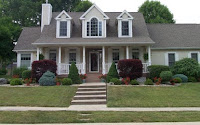I think we paid $17,000 for our 16 acres. It had a hand-dug well that all the local old-timers said had never run dry. We had a house moved onto the land and got to work. That was in June. We were working on the house (a fixer upper), building fence, planting and loving it. Our three kids were very young, and we all pitched in with everyone doing what they could. It was great.
August was hot. Dry, too. You know how Texas’ summers can get. Anyway, the well went dry.
I can remember the feeling of ruin when I realized that this wasn’t going to get better. The well was dry, dry, dry. We had a garden and some livestock. We needed to take baths. We needed to cook and drink. We could do all of that, just not at home.
Oh, and did I mention we couldn’t afford to get a new well dug?
We had a relative that lived about a half mile away that agreed to let us use from her well. We hauled water in opened-topped five gallon buckets, usually on the back of a Honda, Big Red three-wheeler.
One of the things we liked about this land was a wet-weather creek that ran through it. The previous owner had pushed a tank on the creek for watering livestock. We actually enjoyed fording the creek in wet times and the dry-times rumble tumble experience didn’t inconvenience any of us. Until now.
Our one toilet was one of those pre-efficient ones. It took five gallons of water to flush one time. To put it another way, one flush demanded a one-mile round trip on a three-wheeler with a sloshing, overflowing, getting-you-wet, going-bouncy-through-the- creek bucket of water that sometimes didn’t have enough to do the deed by the time you got there. Somehow the dictionary’s “a strong, unpleasant smell” doesn’t quite convey what is in my head when I say that often our house stunk.
I may forget it someday, that Saturday morning, when Carmen, my wife’s college friend, just showed up at our house. She and her family explained that they had lost our phone number, so they wrote us they were coming. (We received her letter the following Monday.) When you live on the back side of 16 acres that’s outside the city limits of a town with less than 400 souls, pop-ins are the exception to the norm. It’s hard to remember, but I think we were about a month into the well-ran-dry period of our life. We planned to work that day, which is to say none of us had made the effort to bathe, wash dishes or anything else requiring water. We stunk, the house stunk and our “Oh, we’re so glad to see you” was, I’m sure, tainted by the mind-scream of “Oh, I wish we had gotten your letter.” We explained and they were very gracious, but that will forever be “my most uncomfortable moment.” And water was the culprit.
For all you “location, location, location” folks, I came up-close to the realization that land without water has a lower value than land with water. How much less? About 100%.
I, again, don’t remember the details, but we gathered up enough coins to have Billy Harris come out and drill us a well. It was a good well with cold, sweet water, and everyone lived happily ever after. We have since sold that beautiful place and moved on. We have city water now, and our house is clean and smells good. We shower, brush our teeth, wash dishes, water the yard and flush the toilet without a thought.
Could it happen again? What’s your answer? Could it?
Here’s the take-home from this true story:
--Yes, it could indeed. Water could be unavailable–very easily.--
One way is quick. If you lost electricity, you would be without water fast. And there would be absolutely nothing you could do about it but say, “Go, man, go!” to the utility guys. But, let’s say they went home because they couldn’t fix it. The source, the generator, went down. If you will let your mind consider your state, you will see you are in exactly the same position we were almost 30 years ago, with one huge exception. You would have no place to haul water from. (And, your car would have had its last tank of gasoline because there was no way to pump the fuel.) Bottled water? Sure, buy all you can, but watch out for that increasingly desperate mob that is trying to beat you to the punch. Like everyone else, be sure and buy a lot because you have now discovered, how incredibly valuable water is.
The other real possibility is one you won’t even consider and that is the loss of your water supply. The fact is, this is where almost every US city is headed right now unless something happens. What “something”? Either new sources of water are going to have to be discovered or we are going to have to use less water. Maybe a lot less water.
That’s my call to you. Start using less water. Use just what you need, but no more. We have started a water catchment system at our house. We are using “just enough water” to water our lawn. We’ve installed a low-flow shower head, and our toilet uses a fraction of the old style.
It’s made a difference on our water bill even though we’re in the baby-steps stage. But, if we all did what we could, when we could, the cumulative affect could be future-changing.
You have choices now. Please make wise ones.
Comments? Please let me hear.









